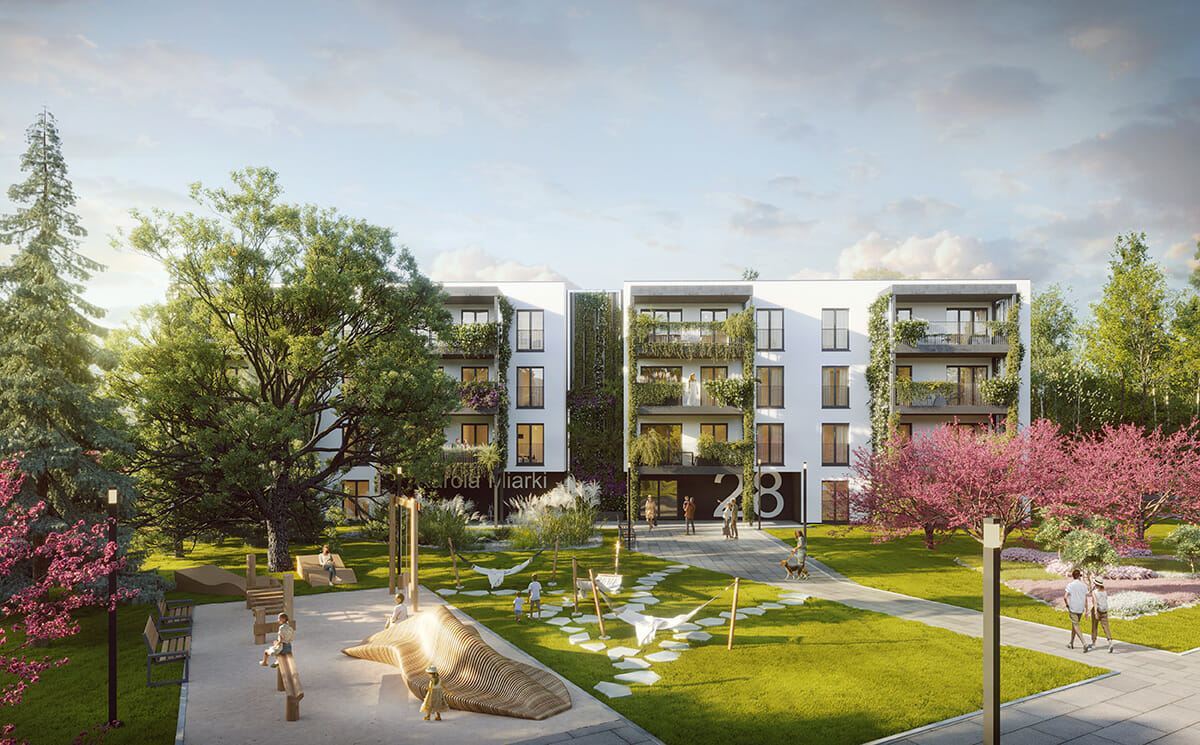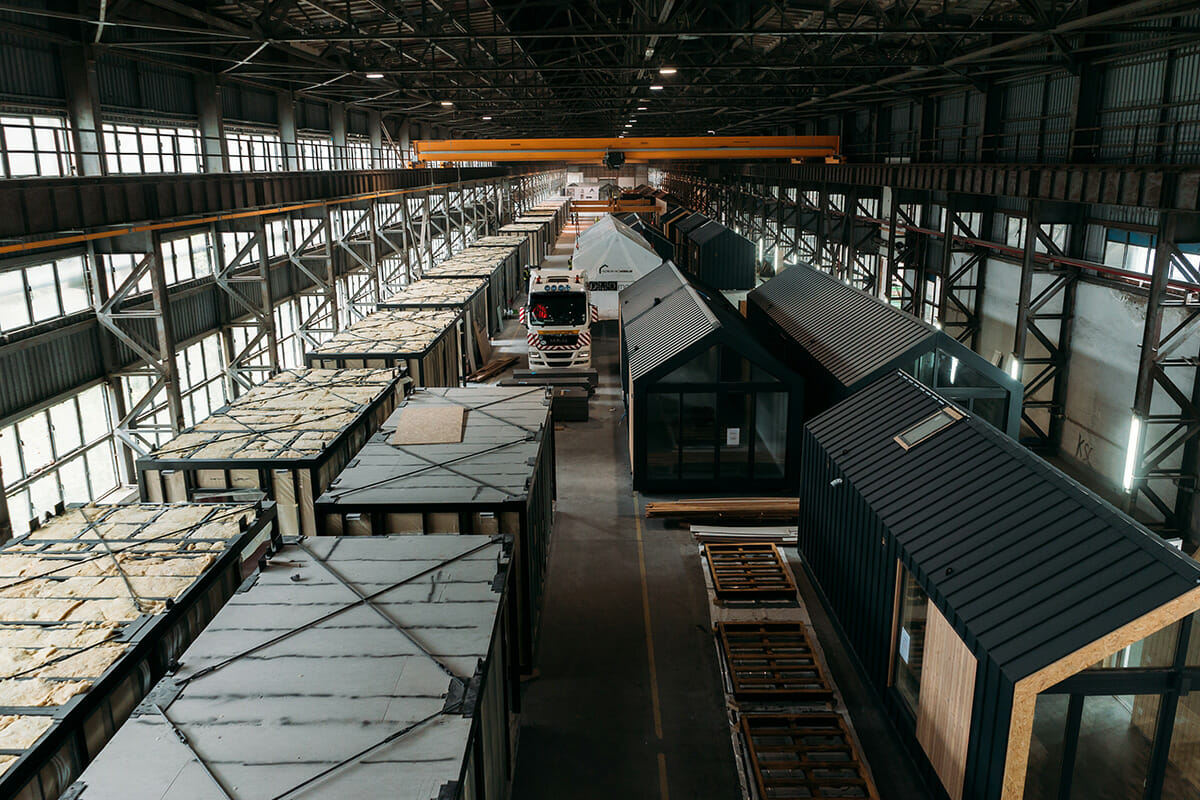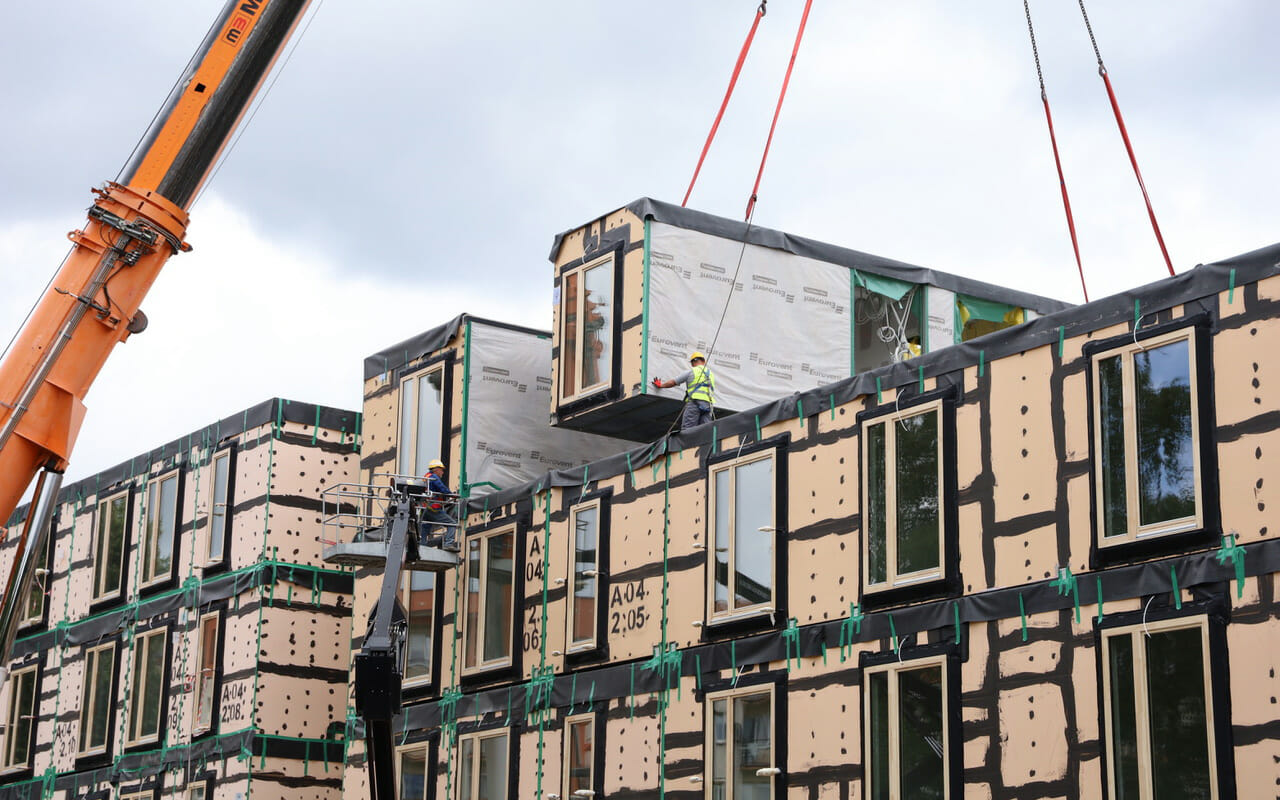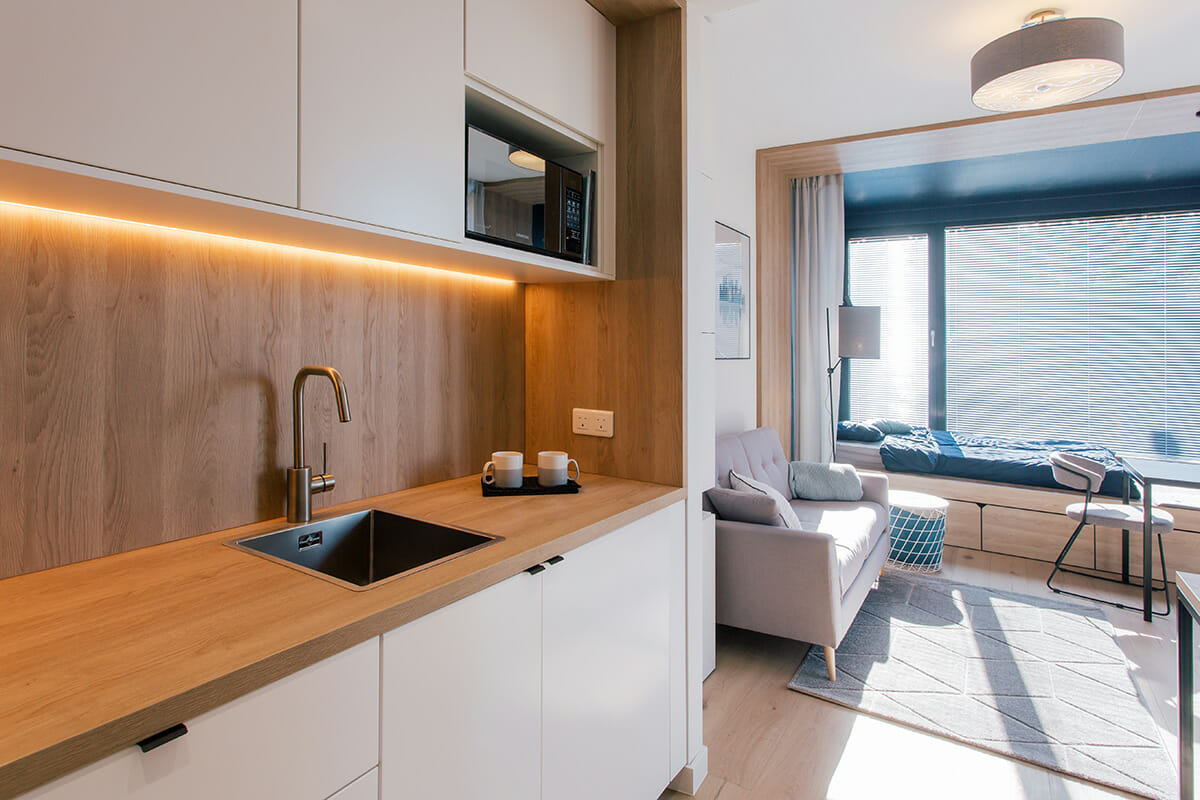Sustainable and Energy-Efficient Solutions from DMDmodular
The real estate market needs a revolution – it is responsible for 38% of greenhouse gas emissions that enter the atmosphere. Therefore, it will play a
significant role in introducing solutions to meet the challenges of the future. Upcoming changes in regulations concerning the ecological aspects of buildings will soon compel real estate investors to seek urgent solutions enabling them to achieve the objectives outlined in the Net Zero strategy. DMDmodular has recently achieved a significant milestone by successfully completing a relevant energy-efficient housing project, fully financed by EU funds, that tackles the industry’s most pressing challenges.

This energy-efficient multi-family building emerged as a response to an initiative led by the Polish National Center for Research and Development, titled “Energy and Process-Efficient Modular Construction” was designed and build using a volumetric modular system, and It was developed by DMDmodular in collaboration with researchers, architects, and technologists.
The project comprises 29 apartments ranging in size from 45 to 70 square meters, and it was materialized through 56 fully finished and furnished modules. These modules, manufactured at DMDmodular’s facility near Kraków, were transported and assembled in Mysłowice, Poland during July 2023.
This building stands as a technology demonstrator, offering an invaluable scalable and global solution for both local governments and private investors developing projects across the countries. Energy efficient modular technology can effectively address the housing shortage and energy crisis, as well as rising construction costs associated with traditional methods.
The project is defined by its superior quality finishing, energy efficiency, and remarkably rapid construction timeline of just 4 months. This high quality, energy efficient and quick delivery method not only can help alleviate housing shortages and the immediate need of building solutions to rebuild Ukraine (only 250 km from the Ukrainian border), but also significantly enhances returns on investment in the build-to-rent sector, encompassing hospitality, PRS ventures, co-living initiatives and student accommodations, compared to conventional construction techniques.
The showcased multi-family building integrates innovative solutions that enable a positive energy balance, resulting in surplus energy generation. It incorporates cutting-edge air handling units with 95% air recovery efficiency, moisture recovery systems, ceiling-based heating and cooling through capillary mats, thermal energy storage, and thermal energy recovery from sewage tanks. The building solely relies on renewable energy sources for its energy needs and integrates measures to minimize water consumption and the overall carbon footprint.
The demonstrator was also developed with numerous sustainable materials from Polish and foreign companies. One of them is the Norwegian waterproof wall systems in the form of easy-to-install panels. Manufactured from PEFC certified, layered plywood and high-pressure laminate, Fibo’s wall panels offer a sustainable - a 40% lower carbon footprint - alternative to tiles. The panels have been installed on surfaces where high strength, durability and quick assembly have been implemented in bathrooms and kitchens.
The garnered experience of DMDmodular has facilitated the establishment of a seamlessly coordinated supply chain comprising cooperating companies. For investors, this translates to project implementation stability and cost predictability, which, especially in light of the fluctuating prices of construction materials, stands as one of the advantages of DMDmodular technology compared to conventional methods.
Poland offers a sustainable and efficient supply chain which is a perfect environment for company Fibo, which supplies DMDmodular, focused on
turn-key modular units. The country has become one of the hottest manufacturing clusters in Europe as the economy continues to perform strongly being among the three fastest growing economies in the EU. Poland is a major producer and supplier to the automotive industry and a leading manufacturing position in the windows industry in the EU. And it holds the fourth position in the world as an exporter, and sixth place as a producer in the furniture industry. Thanks to the stable and credible local supply chain, DMD claims to be the attractive and reliable business partner for the UK construction market.
DMDmodular is an award-winning company focusing on the housing and hospitality industries, delivering unique volumetric modular solutions to international markets. Noteworthy recent developments are PBSA schemes in Scotland, Denmark, and Switzerland and numerous houses for recreational parks in the Benelux region. Furthermore, the company is presently engaged in several hotel projects, encompassing establishments in the UK and Belgium. DMD earned international recognition in 2022 by securing an award in the Green Building Category for its innovative co-living modular solution implemented in Paris.
More from Modular Advantage
AoRa Development Aims for New York’s First Triple Net Zero Building Using Modular Methods
More cities are providing funding for newer infrastructure projects as long as they meet sustainability requirements. This is how modular can fit the bill, thanks to its lower waste production.
Developers and Designers: Lessons Learned with Modular Design
Modular construction is attractive to many developers because sitework and module construction can occur simultaneously, shortening the schedule and reducing additional costs.
UTILE: Putting Modular Building on a Fast Track
In Quebec, UTILE is taking the lead in creating affordable modular buildings to help decrease the student housing shortage. During the process, the company discovered what it takes to make the transition to modular building a success.
Sobha Modular Teaches Developers How to Think Like Manufacturers
With its 2.7 million square foot factory in UAE, Sobha Modular is bringing both its high-end bathroom pods to high-end residences to Dubai while developing modular projects for the U.S. and Australia.
RoadMasters: Why Early Transport Planning is Make-or-Break in Modular Construction
In modular construction, transportation is often called the “missing link.” While it rarely stops a project outright, poor planning can trigger costly delays, rerouting, and budget overruns.
Navigating Risk in Commercial Real Estate and Modular Construction: Insights from a 44-Year Industry Veteran
Modular projects involve manufacturing, transportation, and on-site assembly. Developers must understand exactly what they are responsible for versus what they subcontract. Risk advisors should research the developer’s contractors, subcontractors, and design-build consultants—especially the modular manufacturer.
Art²Park – A Creative Application of Modular and Conventional Construction
Art²Park is more than a park building—it’s a demonstration of what modular construction can achieve when thoughtfully integrated with traditional materials. The use of shipping containers provided not only speed and sustainability benefits but also a powerful structural core that simplified and strengthened the rest of the building.
Building Smarter: A New Standard in Modular Construction Efficiency
Rising material prices, labour shortages, expensive financing and tightening environmental rules have made conventional construction slower, costlier, and more unpredictable. To keep projects on schedule and within budget, builders are increasingly turning to smarter industrialized methods.
Resia: Breaking All the Rules
Resia Manufacturing, a division of U.S.-based Resia, is now offering prefabricated bathroom and kitchen components to industry partners. Its hybrid fabrication facility produces more precise bathroom and kitchen components (modules) faster and at lower cost than traditional construction. Here’s how Resia Manufacturing does it.
How LINQ Modular Innovates to Bring Modular To The Market in the UAE and Beyond
LINQ Modular, with an office and three manufacturing facilities in Dubai, is a modular firm based in United Arab Emirates. The company is on a mission: to break open the housing and construction markets in the Gulf Cooperation Council (GCC) area with modular.













